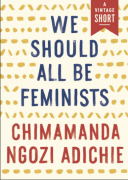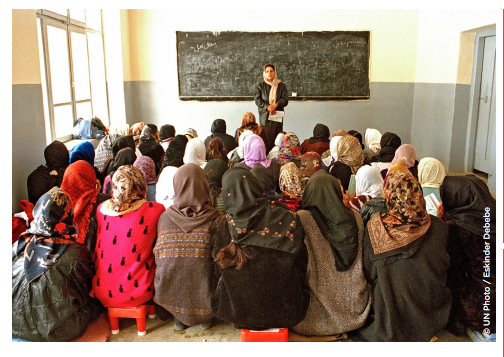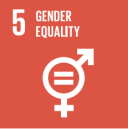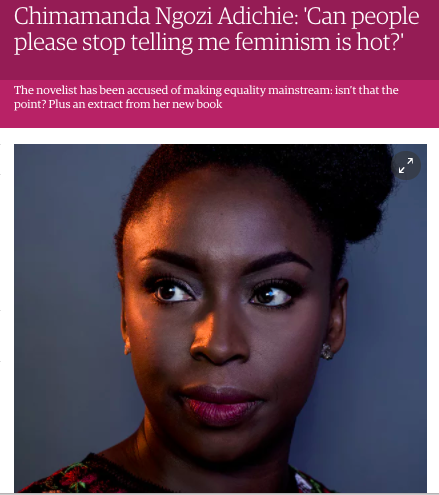What do we talk about when we talk about feminism?
Feminism is a tricky term in the title of this course, in that it’s such a multilayered and contested term. Let me try to give a couple of examples in the context of the title of this course. “Global Feminism and the Media”. . . It could refer, for example, to:
- A general, often overtly political position, ideology, that pertains to women’s roles in the society
- A practical agenda related to development and women’s role in it.
- This you know already: A broad field scholarship (“feminist media studies”) that has many, many re-iterations, paradigms, and that can fall under such broader categories as women’s studies or gender studies.
Example 1: Global feminism as a principle
Please screen this talk…
Or read the transcript, or listen to the podcast.
This famous talk by Adichie, the Nigerian-American bestselling author, discusses a need for global feminism; global in the sense of the universal need to empower women, that has to be understood by women and men.
It is ironic, as we have already learned, that Beyonce used this text, after just having been bashed by the iconic bell hooks…

hooks and Adichie both argue that feminism is for everyone (A., too, has written a book about it; as did hooks, link to the full text in the last research post). But they seem to represent somewhat different starting points and values.
In addition, Adichie has given the now-famous TED Talk about the danger of the single story — the need of situated understandings. Check it out here, if interested!
Example 2: Global feminism and gender as a factor of global development
Half The Sky: Introduction
Your course book (literature review) Half The Sky discusses the role of women in (global) development and notes that, in very practical ways, the more women are given opportunities in a society, the better the society fares in terms of economic, political, social, and cultural development. At the same time, the introductory chapter highlights some significant challenges that are not exclusively problems of the Global South (even if the book seems to implicitly indicate that), including sex trafficking, forced and unpaid labour, and gender-based violence.

It’s not only the authors of the book, but the United Nations and its Sustainable Development Goals, that point to the same goal (SDG5):
Women and girls represent half of the world’s population and therefore also half of its potential. But, today gender inequality persists everywhere and stagnates social progress. As of 2014, 143 countries have guaranteed equality between men and women in their Constitutions but 52 have yet to take this step.
 Here’s a short policy brief about SDG #5 – Gender Equality – Why? 5_Why-it-Matters_GenderEquality_2p
Here’s a short policy brief about SDG #5 – Gender Equality – Why? 5_Why-it-Matters_GenderEquality_2p
Example 3: Feminism and scholarship
Current Perspectives, chapters 3 and 15 (your course book, please read).
It’s good to remember that feminism, similar to any movement, takes many forms and entails many fractions. The political strands of feminisms also influence academic scholarship, and they do so in terms of topic, as well as in terms of research methods and ethics.
Traditionally, as Liesbet van Zoonen outlines in her seminal book Feminist Media Studies (1994), the field has researched:
- Women’s representations in the media from news to talkshows;
- Women as producers of media products (as journalists, as film makers, and so on); and
- Women as media audiences.
In the digital media era, these three fields are merging and becoming more and more complex.
This table is a very crude simplification, with relatively broad time frames and overlapping categories (that can and do co-exist). Note also that the categories are mine, distilled from what I have learned over the years, and do not represent a standard way of mapping feminist studies. Yet, I hope the table gives you a glimpse of the diversity of academic feminism:
| Feminism as a social movement | Academic research: thematic focus | Academic research: methodological focus in studying the media |
| The First Wave of Feminism: Equality
19th century to mid 20th century (in the West) |
Women in the public realm (politics, public sphere in general).
Women need to be given equal treatment, and positions, with men. |
Quantification of representation of women in the media; quantification of women’s representation in media professions… (from social sciences) |
| The Second Wave of Feminism: Difference 1970s-80s
|
Women’s needs as media audiences, women’s voices as media makers Women are inherently different from men. | Qualitative textual and discourse analyses (from humanities) to uncover women’s voices and experiences in media texts |
| The Third Wave of Feminism: Diversity
1990s->
|
Gender is not the only defining factor; interconnections of gender, race, class, age, geography… | Multi-method analyses in understanding what the media does to construct gender (what is considered “feminine” and “masculine”); the crossing of different factors; cross-cultural studies (e.g., migration, gender and the media; cases in the Global South). |
| Beyond Third Wave? Neo-Feminism, Post-Feminism, Post-post feminism….
Some say this is a variation of the Third Wave, not a separate era… |
Big questions: Do we need feminist media studies anymore? Does the category “women” matter anymore; should we discuss the continuum of genders? | New methods in studying identity and identification; brought by the blurring boundaries of mainstream media and alternative media; legacy media and online/mobile platforms; and users as content creators. |
As the assigned texts in “Current Perspectives…” note, today’s “feminist media studies” faces big, existential crises that are often considered generational (1st and 2nd wave approaches vs. 3rd and post…). The proliferation of media, and the hybridization of the idea of who creates content for whom and why, has complicated feminist research agendas (see Gargi Bhattacharyya’s text, i.e., Chapter 3). Add to this the hybrid nature of feminism as a concept, and the question Andrea Press (Chapter 15) poses, is valid:
What to make of “feminist” in feminist media studies?
Another question to ask is, as Kiah does in her blog:
Is feminism elitist, Western, more academic than practical?
At the same time, some argue that perhaps we need feminist media studies more than ever; perhaps the hybridity of the field responds to the complexity of issues. As Press notes:
Our field has always been poised between the humanities and the social sciences simply by the nature of what we examine. …
The hybrid nature of feminist media studies has meant that, even as we analyze cultural phenomena humanistically, we are also interested in their demonstrated impact on women and other oppressed groups…
…[W]hat is at stake for feminist media studies … is retaining the critical perspective… Continued violence against women, inequities in unpaid and paid labor forces…and the path to “femininity” mandate that we not lose sight of these central issues as our field continues to develop.
As Bhattacharyya reiterates, old questions are new again, and the question of gender still pertains, for instance, in terms of gender and sexual imagery online; in terms of access to communication technologies and other economic factor; and in terms of the security of participation via communication forums.
Your assignment:
The above were just some crude generalizations of some approaches to feminism that we can take, and that relate to the context of our course.
Please comment below briefly what you think, from your situated perspective: Has feminism become elitist academic exercise, a kind of theoretical play? Do we need feminism? Feminist (media) studies? Yes, no, why? You can be conflicted, too…
This is the way you will respond to most of the theory sessions, here on my blog, and use yours to develop your research. You can sign up here with any screen name you’d like to use. Just use your SJU email address if asked when commenting (I’m the only one who will see it.). Sometimes WordPress singles out comments to be moderated — so if you don’t see yours immediately posted, not to worry. I will check and moderate frequently.
Due Thursday 6/8 at midnight!




Hello Professor,
Funny you mentioned Kiah’s blog post because that line of her situated knowledge stood out to me as well. I am also glad you have said that we can be conflicted because right now I think feminism on its own is conflicted, without our view on it. Personally I dont think gender roles are a topic of conversation anymore considering there has been an extreme tilt in culture with fashion and attitudes thanks to social media and other outlets of self expression including the media’s contribution to the movement.
As our country takes strides to equality, we are mostly focused on the rights of LGBTQ and minority groups. Is it because women have gotten (mostly) what they wanted and its time for a new trend? Are we so obsessed with whats trending that we lose sight of what is happening in the world ?? All over the world the girls that are being forced to marry young or become prostitutes, ect. THATS who feminism is for. Thats who still needs feminism. That is who needs us to study and fight for them.
This has made me want to focus even more on how women have succeeded here in america, but by doing so may have lost sight of what is happening globally.
Thank you for this post, it has been helpful in forming my perspective on how feminism is viewed today.
GIRL POWER.
-Alexis Dursunyan
LikeLiked by 1 person
Indeed: We could argue that from a GLOBAL perspective, there are two core issues: 1) There are plain and simple HUMAN RIGHTS violations that are gender-based (even if benchmarked against the UN Universal Declaration of Human Rights); and, 2) Gendered cultural-socio-political practices that discriminate one gender mean WASTE OF RESOURCES. Many a research effort notes that the more educated the women, the more opportunities for development in terms of economy.
This is not to say that symbolic representations that we face in the media daily wouldn’t warrant scrutiny. You made me think that perhaps there’s a continuum of symbolic – concrete issues. And, we shouldn’t forget that symbolic representations impact women and men, different sexual orientations, ethnicities… etc. Not simply a feminist question…
LikeLike
I believe their is a shift happening, but still, much of the conversation surrounding, and much of the authority to speak on feminism is credited to those in academia. Which maybe why feminism seems elitist.
Feminism is important, without it I do not believe we would be discourse on how to define personhood, or the damaging effects when there is an imbalance of power between genders.
LikeLiked by 1 person
This is interesting: remember that feminism started as a social-political movement, or women’s right to full, autonomous citizenship (e.g., voting rights). Now, it seems it has migrated to the realm of the intellectual, or at least is perceived as such. And you are predicting a swing of the pendulum back to social movements?
LikeLike
I feel that my response may be conflicting…
Feminism is necessary, but it is not inclusive (from my situated perspective). I am still learning a great deal about feminism, and I have grown up with this word having a negative connotation and a negative image. There are times that I feel I cannot speak on the subject of feminism because I am not an activist, or may hold ideals that are not extreme enough to fit in with “real” feminists. In Alexis’ post, she mentions that the media has created a divide, and I believe this divide has in turn created an noninclusive environment.
To answer the question as to whether feminism has become elitist, I would say the answer may again be within the media. The media often depicts feminists as looking down upon those who do not agree with them, and like they are too sensitive…this is not the case. I believe that anyone can be a feminist, and your beliefs do not have to be extreme.
Feminism is necessary, but we have to change the perspective of the next generation in order to ensure it is accepted in a positive light.
Sarah
LikeLike
(Sorry the belated posting of your comment! Something alerted WP to send this to spam.) This is interesting and speaks exactly about our next theory session “who can speak for whom”. What is a real feminist? Isn’t it interesting that something so seemingly simple — equal rights for genders — has become so very complicated, so that public intellectuals need to write texts like “Feminism is for everybody”. And we need to wonder: Are we “real” feminists? This is a topic not so often discussed, but especially important to global feminism, due to significant cultural differences different women around the world experience.
LikeLike
When we talk about feminism it is true that much of the stories and academia are more westernized. In this respect their are many stigmas attached to the western world oversees and the manifestation of our country and it’s institutions. Adichie’s anecdote about her own experiences and the notion that she was corrupted by “western books” and that feminism was not her culture still speaks a lot to the broad view of feminism around the world. It makes sense for us to begin our studies through a situational analysis of feminism and identity. As media envelopes our lives and we become more connected around the globe and share and adopt one another’s cultures and practices our “situation” changes and this is progressive for feminist study and their is still need for it.
LikeLiked by 1 person
Love your reference to Adichie. This is exactly why she has become a kind of a symbol of today’s feminism that is becoming more sensitive to global issues (partly due to the media), and that is becoming more inclusive and less imperialistic. There’s a growing understanding that, while there are big issues in many countries to be solved, experiences and practices of the Global South are not necessarily “less”; they can be more progressive than those of the West. More about this on Tuesday!
LikeLike
Hi professor!
This was a question that definitely made me think. I think that feminism has a very negative connotation to it. Many people are not educated enough with the movement or they are closed off to it all. I believe much of this has to do with the media. The media tends to work in a very specific way. They only show things that will get the most attention because that is how news becomes popular. By showing “feminists” who “hate men” or feminists who are a bit more vulgar, people will backlash and then the story is able to be sold. By doing this, we as a society lose what feminism is really all about. It isn’t just for women either, feminism is for anyone who accepts the equality of women to men.
I think it is so necessary for feminism to be taught. I believe by changing what the world sees through media, we would be able to make farther strides in the movement.
– Nicole
LikeLiked by 1 person
Thank you Nicole! An excellent point about visibility, exposure, attention. The media alone are not guilty; many use loud, vulgar approach to get media attention. See how it went with hooks’ commentary on Beyonce…I love your idea of education bringing nuance to the debates.
LikeLike
Great post, really exemplifies the diversity within ‘Feminism’
LikeLike